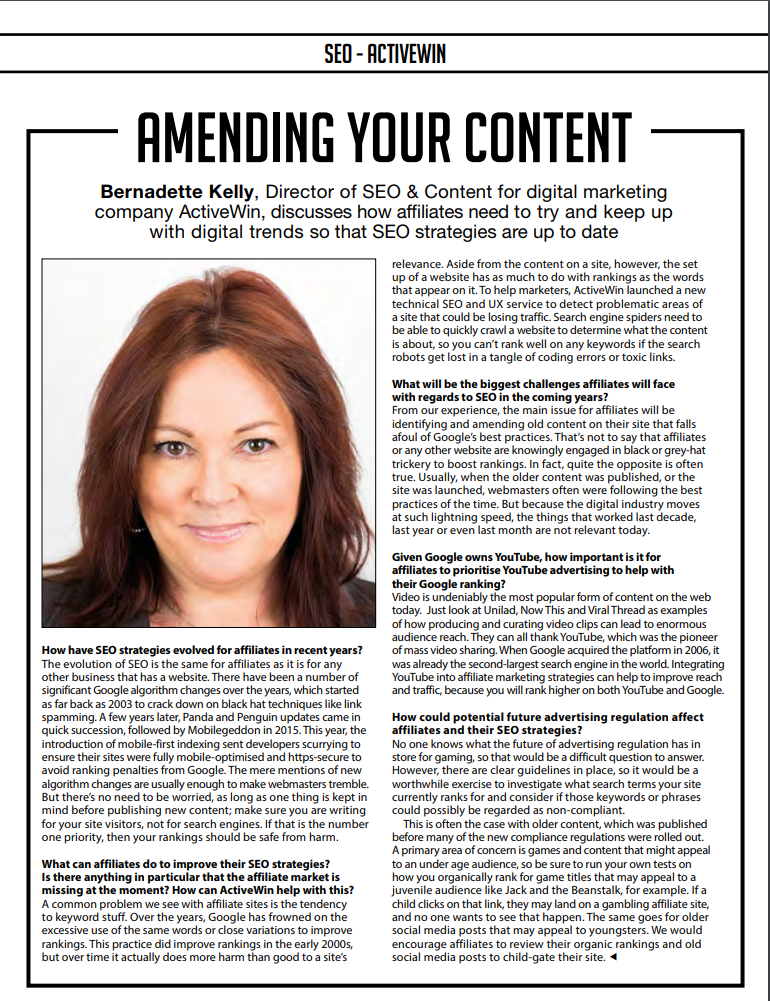Bernadette Kelly, our Director of SEO & Content, talks to Gambling Insider about the opportunities that businesses and affiliates can benefit from by keeping up-to-date with the latest SEO trends.
How have SEO strategies evolved for affiliates in recent years?
The evolution of SEO is the same for affiliates as it is for any other business that has a website. There have been a number of significant Google algorithm changes over the years, which started as far back as 2003 to crack down on black hat techniques like link spamming.
A few years later, Panda and Penguin updates came in quick succession, followed by Mobilegeddon in 2015. This year, the introduction of mobile-first indexing sent developers scurrying to ensure their sites were fully mobile-optimised and https-secure to avoid ranking penalties from Google.
The mere mentions of new algorithm changes are usually enough to make webmasters tremble. But there’s no need to be worried, as long as one thing is kept in mind before publishing new content; make sure you are writing for your site visitors, not for search engines. If that is the number one priority, then your rankings should be safe from harm.
What can affiliates do to improve their SEO strategies?
Is there anything in particular that the affiliate market is missing at the moment? How can ActiveWin help with this? A common problem we see with affiliate sites is the tendency to keyword stuff. Over the years, Google has frowned on the excessive use of the same words or close variations to improve rankings.
This practice did improve rankings in the early 2000s, but over time it actually does more harm than good to a site’s relevance. Aside from the content on a site, however, the set up of a website has as much to do with rankings as the words that appear on it.
To help marketers, ActiveWin launched a new technical SEO and UX service to detect problematic areas of a site that could be losing traffic. Search engine spiders need to be able to quickly crawl a website to determine what the content is about, so you can’t rank well on any keywords if the search robots get lost in a tangle of coding errors or toxic links.
What will be the biggest challenges affiliates will face with regards to SEO in the coming years?
From our experience, the main issue for affiliates will be identifying and amending old content on their site that falls afoul of Google’s best practices. That’s not to say that affiliates or any other website are knowingly engaged in black or grey-hat trickery to boost rankings. In fact, quite the opposite is often true.
Usually, when the older content was published, or the site was launched, webmasters often were following the best practices of the time. But because the digital industry moves at such lightning speed, the things that worked last decade, last year or even last month are not relevant today.
Given Google owns YouTube, how important is it for affiliates to prioritise YouTube advertising to help with their Google ranking?
Video is undeniably the most popular form of content on the web today. Just look at Unilad, Now This and Viral Thread as examples of how producing and curating video clips can lead to enormous audience reach. They can all thank YouTube, which was the pioneer of mass video sharing.
When Google acquired the platform in 2006, it was already the second-largest search engine in the world. Integrating YouTube into affiliate marketing strategies can help to improve reach and traffic, because you will rank higher on both YouTube and Google.
How could potential future advertising regulation affect affiliates and their SEO strategies?
No one knows what the future of advertising regulation has in store for gaming, so that would be a difficult question to answer. However, there are clear guidelines in place, so it would be a worthwhile exercise to investigate what search terms your site currently ranks for and consider if those keywords or phrases could possibly be regarded as non-compliant.
This is often the case with older content, which was published before many of the new compliance regulations were rolled out. A primary area of concern is games and content that might appeal to an under age audience, so be sure to run your own tests on how you organically rank for game titles that may appeal to a juvenile audience like Jack and the Beanstalk, for example.
If a child clicks on that link, they may land on a gambling affiliate site, and no one wants to see that happen. The same goes for older social media posts that may appeal to youngsters. We would encourage affiliates to review their organic rankings and old social media posts to child-gate their site.

This article was originally posted here.


